The foreign ministry shall not support the cause of some far flung rebels against a nation that we are not even foes with. This 'Republic of Yaroslavl' will not have any kind of German backing.
Sonderweg oder Anderweg? -- An interactive AAR in the Hohenzollerns megacampaign
- Thread starter Avindian
- Start date
-
We have updated our Community Code of Conduct. Please read through the new rules for the forum that are an integral part of Paradox Interactive’s User Agreement.
You are using an out of date browser. It may not display this or other websites correctly.
You should upgrade or use an alternative browser.
You should upgrade or use an alternative browser.
NEWS UPDATE
The British Empire has decided to support the Yaroslavl rebels. The people of Europe expect Germany to take a side.
Dieter Reinhold, GRNN
((@NachoEater: time to form a crisis team, I think. Admin hat on.))
As DutchGuy so eloquently put it, crises do seem to be slowing things down a bit. We'll probably have a crisis every couple of years for the rest of the AAR. I'm opening the floor to suggestions to streamline the process, if indeed the process needs to be streamlined. Whatever we decide, we'll solve this crisis the old way.
The British Empire has decided to support the Yaroslavl rebels. The people of Europe expect Germany to take a side.
Dieter Reinhold, GRNN
((@NachoEater: time to form a crisis team, I think. Admin hat on.))
As DutchGuy so eloquently put it, crises do seem to be slowing things down a bit. We'll probably have a crisis every couple of years for the rest of the AAR. I'm opening the floor to suggestions to streamline the process, if indeed the process needs to be streamlined. Whatever we decide, we'll solve this crisis the old way.
((Perhaps the Foreign Minister establishes a list of countries at the start of their term, and all crisises are automatically declined unless the nation is on that list or another country takes a side first.))((As DutchGuy so eloquently put it, crises do seem to be slowing things down a bit. We'll probably have a crisis every couple of years for the rest of the AAR. I'm opening the floor to suggestions to streamline the process, if indeed the process needs to be streamlined.))
((I have an idea for a bill to propose that should make forming crisis teams every time unecessary .))
((We could adopt a system similar used to the one in ABE. The government guides the playthrough, and thus makes decisions during the play period . Inform to Kinghigh99 or any player of that game how it works exactly.))
The crisis team for the matter of the independence of the Republic of Yaroslavl shall be comprised of the following, provided they consent:
Myself
Konrad Friedrich von Hohenzollern, Chief of General Staff
Johannes Carile of the DLP
Friedrich Gerulf of the DSU
Walther Herwig of the DLP
Jean-Pierre St. Gerard of the KPD
Clarissa Rafanelli of the KPD
((The wording of the formation of a crisis team is slightly vague; may you only have two participants of the two largest parties, or is it those two that are required, and then from the other parties? It is quite difficult to find active players to form one of these, if so.))
Myself
Konrad Friedrich von Hohenzollern, Chief of General Staff
Johannes Carile of the DLP
Friedrich Gerulf of the DSU
Walther Herwig of the DLP
Jean-Pierre St. Gerard of the KPD
Clarissa Rafanelli of the KPD
((The wording of the formation of a crisis team is slightly vague; may you only have two participants of the two largest parties, or is it those two that are required, and then from the other parties? It is quite difficult to find active players to form one of these, if so.))
Last edited:
Honestly, these crisis teams are pointless bureaucratic exercises. Our Reichspresident should do the job, with a unilateral decision being much better than dawdingly twattle of career dullards.
((It appears there's another problem with the crisis rules - Only 5 people (plus the host) can be in a conversation at a time. This leaves us one short for the team.))
((We should appoint a crisis team to deal with the crisis with the crisis team rules))
I humbly accept the appointment I have been given.
Jean-Pierre St. Gerard, KPD
((You could start a group, @NachoEater, for the crisis team. I know about the convo limit, sadly. You can also just PM me what everyone else decides; I personally would only vote in the case of a tie.
Keep making crisis team suggestions, and we'll visit it after this one has been dealt with.))
Jean-Pierre St. Gerard, KPD
((You could start a group, @NachoEater, for the crisis team. I know about the convo limit, sadly. You can also just PM me what everyone else decides; I personally would only vote in the case of a tie.
Keep making crisis team suggestions, and we'll visit it after this one has been dealt with.))
The crisis team has decided that Germany will remain neutral in this conflict for now. However, if this crisis looks likely to erupt into war, the crisis team will convene again at a later date.
((Remain on the fence for now. If the crisis reaches 80 heat, we'll decide whether to intervene again.))
((Remain on the fence for now. If the crisis reaches 80 heat, we'll decide whether to intervene again.))
1905: Tensions in Eastern Europe
As Chancellor Franz von Bavel-Timmermans neared the end of his first term in office, he had to admit that overall, things had gone pretty well for Germany. Domestic tensions had been mostly quiet, and Axel Wouters was proving to be a remarkable Foreign Minister. Wouters aggressively protected the interests of the Republic of Germany, but did so in a way that merely threatened force without ever employing it. The German military remained revered by the average German, but the army and navy had done virtually nothing of consequence for years. There were certainly potential cracks in Germany's armor: for example, German fortifications were woefully out of date and had not been upgraded for decades. A serious overhaul of the army was probably necessary too, as Konrad von Schwaben had only ever promoted the cause of the navy during his lengthy tenure of Minister of War. Thankfully, Wouters could skillfully use the appearance of force to manage German interests, even engineering a rapprochement between Tver and Poland while France and the United Kingdom fought to dismember the hapless republic. German neutrality in the crisis was so ominous that both parties simply agreed to let the matter drop rather than continue to what might become a world war.
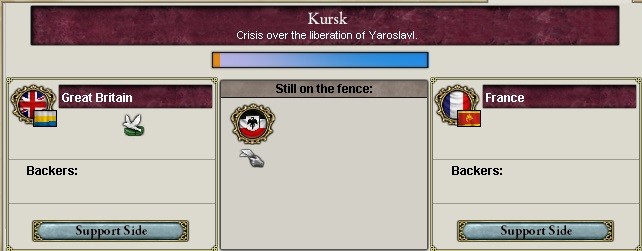
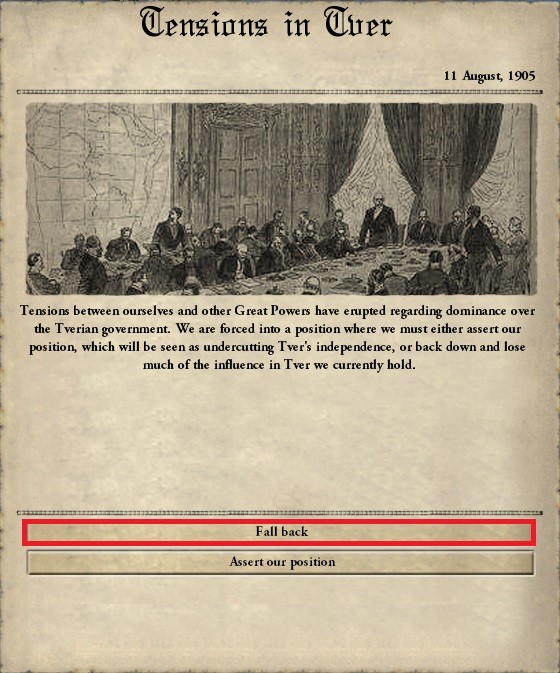
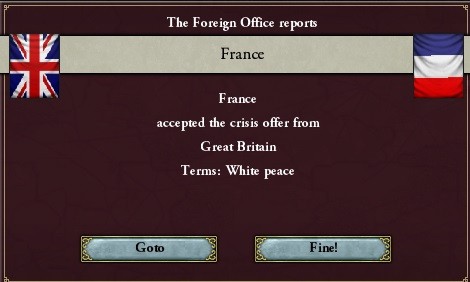
However, the domestic peace that Germany had enjoyed started to falter. On the heels of German athletes returning home with several medals (including a bronze medal for shooting for Erich von Hohenzollern), a generation of young Germans began to question the peaceful conciliatory tone set by the Socialist government. While none of these Germans were yet of voting age, they grew angry that Germans had grown so complacent. Some of them even insisted that the absence of war was a negative, not a positive. One of the centers of this new movement was Anhalt, which was wracked with unemployment. Germans who could not find factory jobs had traditionally joined the army, but with army budgets failing to increase, there were many angry Germans with nothing to do.
Matters came to an end when the German Olympic Team toured Anhalt with the victorious athletes. A group of these angry young Germans threw rotten fruit and vegetables at the athletes, but one such protester was unsatisfied with produce. He threw a brick and hit Erich von Hohenzollern between the eyes, knocking him unconscious. A group of the Gendarmerie fired into the air to disperse the crowd, restoring order in record time. This response did not go uncriticized, and an anonymous writer castigated the Ministry of the Interior for "excessive force", despite the fact that the young von Hohenzollern was the only person injured in the fracas. As people began to campaign openly for the office of Reichspräsident, other editorials appeared, many of them aimed at the "liberal treason" of Johannes Carile, the Minister of the Interior, who had "betrayed the true patriots of Germany by joining with the socialists." It quickly became apparent that officials in the Bundespartei had sanctioned these editorials as a way to win votes for the Presidential election. To most outside observers, there was no difference between the DLP and Bundespartei. Conservatives and Imperialists alleged that the real victim of the story was the once great family Hohenzollern, which had been subverted by liberals to serve their own nefarious ends.
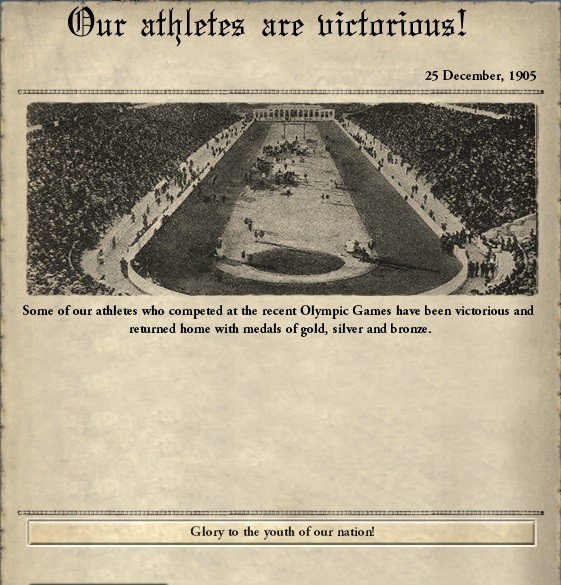
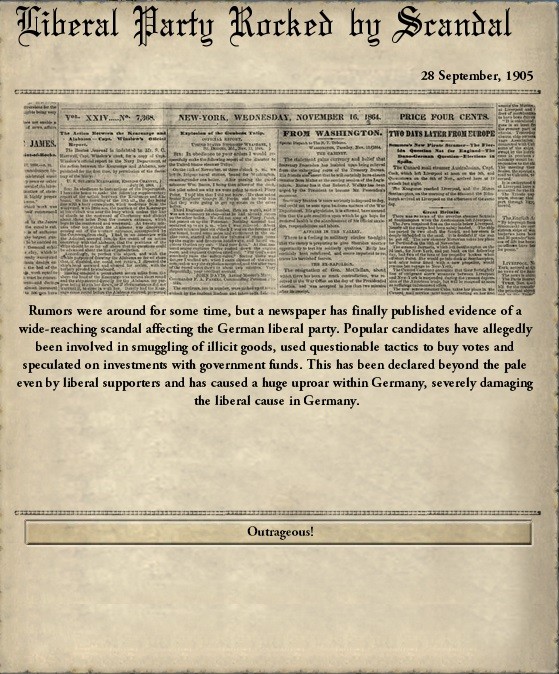
Another avenue of attack for the angry young Germans was the DSU. After all, it was socialists who controlled the German economy, and while the national treasury continued to grow, Germans were going hungry and without work. A campaign demanding new factories and infrastructure upgrades quickly gained popularity. Voices from other German provinces, such as Thuringia and Puglia, joined what was rapidly becoming known as the Anhalter People's Party. The Anhalters (as they were often known) demanded room for Germans to expand, even at the expense of other cultures and countries, if the socialists could not properly manage the domestic economy. Some questioned the wisdom of democracy at all, believing fervently in the power of the Hohenzollerns to end the injustice of German society. The mood of the Anhalters threatened to supplant the Presidential elections, which were held very nervously in the capital in early 1906.
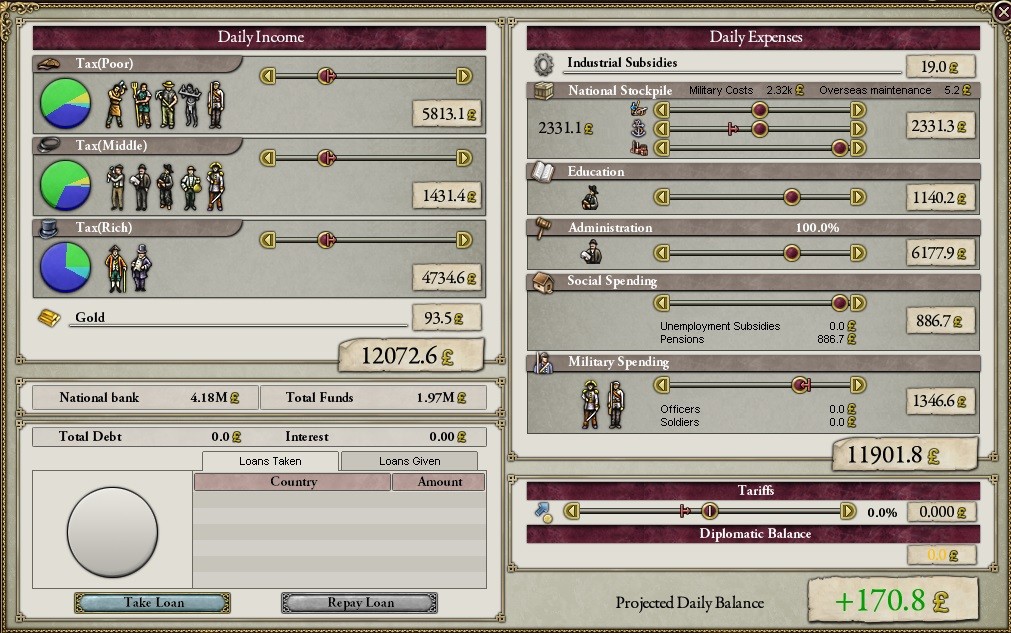
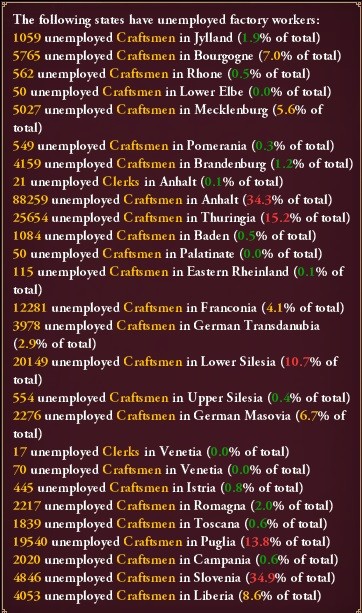
---------------------------------------------------------------------------------------------------------------------------------------------
((Admin hat on))
I obviously intend the Anhalters to be the seeds of our fascist movement, when it eventually forms. Whoever decides to create the party when fascism fires need not necessarily use that name or even these specific issues, but you do have a backstory to build off of. Another possible outcome of this update could be the merger of the DLP and Bundespartei, especially since the BP has been so weak of late (apart from our good friend 'The Liberator'). These are merely suggestions, of course.
Before we consider Presidential elections, I want to resolve the issue of crises. They simply happen too frequently and delay updates. We have several options to resolve this.
1) End crisis teams. I created them as a way to give multiple people voices in foreign policy, but as membership in the AAR dwindles, they may not be necessary.
2) @Warlord Skorr suggested we make a list of countries that Germany is officially "interested in" a mandatory part of Foreign Ministry plans.
3) @NachoEater has noted a solution that he might have, although he has yet to present it.
4) @DutchGuy has offered a possible path from another iAAR, but did not go into details: if he or anybody else wishes to explain the system in that iAAR, we can explore that option.
5) Simply adjust defines.lua to increase crisis cool down times to make them more impactful/important when they do occur.
For the moment, let's just present alternatives. Be as specific as you can when proposing solutions: don't say "go check with this other person" or "look at this other AAR", because that's unhelpful to people who may not be familiar with the system. If you feel comfortable proposing something, you should be able to explain it in detail.
So, have at it, my friends, let's hear what you've got to say!
((The bill that I had in mind was this: ))
The Crisis Act of 1905
Recognising that the current system of creating Crisis teams every time two other great powers are at odds is unwieldy, I propose the following, to streamline the process:
When a rebel nation gains the support of a great powers, and a great power backs the nation it seeks to secede from, thus creating a crisis, the foreign minister will be called upon to submit a crisis plan to the Reichstag. The plan will detail Germany's response to the crisis, whether it be reamaining open to offers, backing either side, or just ignoring it entirely, much like a crisis team would. The foreign minister may, in this plan, request aid from other ministers in the cabinet; for instance, asking the Minister of War to raise army and naval maintanence in preparation for war. Should any member of the Assembly find this proposal objectionable, they may put the plan up for vote, much like in the current system. If the plan is voted against, any member of the Assembly may submit a new plan.
((Essentially, it makes crisis teams unecessary (could be easily adjusted to include crisis teams) and ensures that a quick response can be given by the foreign minister, while still allowing for a 'democratic' option, if that response is controversial.))
The Crisis Act of 1905
Recognising that the current system of creating Crisis teams every time two other great powers are at odds is unwieldy, I propose the following, to streamline the process:
When a rebel nation gains the support of a great powers, and a great power backs the nation it seeks to secede from, thus creating a crisis, the foreign minister will be called upon to submit a crisis plan to the Reichstag. The plan will detail Germany's response to the crisis, whether it be reamaining open to offers, backing either side, or just ignoring it entirely, much like a crisis team would. The foreign minister may, in this plan, request aid from other ministers in the cabinet; for instance, asking the Minister of War to raise army and naval maintanence in preparation for war. Should any member of the Assembly find this proposal objectionable, they may put the plan up for vote, much like in the current system. If the plan is voted against, any member of the Assembly may submit a new plan.
((Essentially, it makes crisis teams unecessary (could be easily adjusted to include crisis teams) and ensures that a quick response can be given by the foreign minister, while still allowing for a 'democratic' option, if that response is controversial.))
Last edited:
((I am okay with the setting change. It is a better system then the one I proposed anyway. Make crisises pop up like every 10 years.
))
))
Germany is becoming weak. We need to make Germany great again.
-An increasingly old and frail Liberator
-An increasingly old and frail Liberator
While I must condemn the violence committed against the German Olympic Team, and more specific, my kinsman, This Anhaltischer Volkspartei makes sense. For too long have we sat idle while the British and the French used their claws against other, minor nations and expanded their power. We must be strong and restore German Hegemony over Europe. It is our godgiven task to rule Europe.Germany is becoming weak. We need to make Germany great again.
-An increasingly old and frail Liberator
And that should be the work of THIS generation. It is time for a renewal of German politics, culture and power. Let us make Germany Great again, Let us give power to those oppressed for so long, the YOUNG !
Wilhelm von Hohenzollern, Assemblyman for Nürnberg
((I will be developing this semi-emancipation ideology into fascism or something close to it, just wait for it.))
((On that note, I will be making a tally up of the average age quite soon.))

